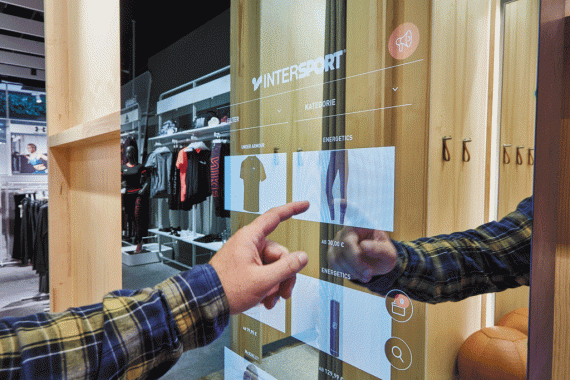
Until now, it has been the case that while customers can call up all the information they need on any product at any time and from anywhere via their smartphone, sales staff on the shop floor often lack this option. Studies have repeatedly shown that many consumers consider themselves to be better informed than sales staff in specialist stores because of their own product research on the Internet. This is especially true of the young target group that has grown up with the Internet. A salesperson can only convey competence if he or she has the information on every product by heart, but this is hardly possible, especially at the change of season, when many new products come into the store.
In sports retail, where advice and expertise are core competencies, such situations frustrate sales staff and customers alike: The salesperson feels helpless and the customer badly advised. So why not also digitize the salesperson and equip them with mobile devices that can help in situations where real detailed knowledge is required?
Some sports retailers have already recognized this problem and are equipping their sales staff with tablets. Whether Decathlon, JD Sports, Sport Scheck, the new Intersport stores or Globetrotter, they are all now relying on the networked salesperson. "We've been working with tablets on the floor for a few months now," says Ariane Graf, Sales Unit Manager at Globetrotter Munich. Housed in a case on the belt, the device is always at hand when the salesperson needs it. The tablet is used to request product information and when the salesperson wants to know if other sizes or colors of an item are in stock.
It can be operated like an online store and displays the availability of goods in real time. "We can also use it to create orders if items are not in stock in-house," Graf adds. The seller can then have products shipped directly to the customer and, for example, waive shipping costs or offer other discounts. There is no fear of contact on the part of the sales staff. On the contrary, says Graf: "The sales staff have been very happy to accept this, it's simply practical."
It's also practical that the product information is always up to date - unlike catalogs, which are only printed once. Videos on how to use items correctly can also be accessed. At Sport Scheck, sales staff can also use an in-store app to create appointments for ski boot fitting or tennis racket stringing. At JD Sports, employees order shoes from the warehouse for fitting, for example, which then roll down an assembly line into the store.
In contrast, the stationary desktops that are permanently installed in the store have turned out to be less practical. "The tablets are replacing our fixed computers," says Ariane Graf. The mobile devices are much more convenient for staff and customers. What has not proved successful, according to many retailers, is the idea that customers themselves can use such terminals to search for further information or other products that are not in stock in the store.
As an extended counter, they were supposed to combine the more extensive web store with the more limited range on offer in the store. But most customers come to the store precisely because they don't want to store online.
"Psychologically, that was quite the wrong message," says Jan Kegelberg, Chief Digital Officer at SportScheck, too. After unconvincing attempts at integrating the web store onto the store floor, the multichannel retailer has developed an in-store app that is used solely by sales staff. Only when the salesperson operates the devices together with the customer does the extended store counter make sense.
The digital devices on the floor open up many more possibilities than just checking product information or availability of goods. They become mobile checkouts and save customers the hassle of standing in line. Mobile payment systems are currently in the test phase worldwide. In contrast to the USA or Asian countries, Germany is not exactly one of the pioneers here. Which mobile payment system will ultimately be best accepted by customers and retailers is far from decided.
Here, too, old buying habits often seem to stand in the way of technical innovations. As recently as May, for example, Wal Mart discontinued its "Scan-and-Go" mobile payment service via a smartphone app because customers did not want to use the new self-service technology. Instead, the retail giant is now trying "Check Out With Me," a service where employees can take over the payment process via mobile PoS devices and also issue a receipt on the spot.
Ultimately, it goes so far that the in-store salesperson can access just as much information about the customers in the store as an online store. Using their digital devices, sales associates can track registered consumers in the store, know their shopping history, preferred brands and sports, and thus have a wealth of knowledge at their fingertips that they can use as a basis for advisory discussions. Artificial intelligence can further help suggest relevant products and tailor advice as best as possible to the customer's individual needs. It can give personalized discounts, call up price comparisons on the web or customer reviews in real time, and thus intensify the bond and trust with the customer.
Of course, retailers in this country are not quite there yet. What is clear, however, is that the digital equipment of the salesperson is not intended to replace him or her, but quite the opposite: it should enable him or her better than ever to fulfill his or her advisory mandate to the satisfaction of the customer.
ISPO Digitize: Tag eins in Bildern
Digital devices on the floor are opening up even more options than just retrieving product information or item availabilities. They’re becoming mobile cash registers and saving the customer the annoying waiting in line. Mobile payment systems are currently in the test phase worldwide. In contrast to the US or Asian countries, Germany is not exactly among the pioneers here. What mobile payment system will ultimately be best received by customers and retailers is still far from being decided.
Here too, old buying habits often seem to stand in the way of technical innovations. Only in May, for example, Walmart discontinued its “Scan & Go” mobile payment smartphone app because customers didn’t want to use the new self-serve technology. Instead, the retail giant is now trying “Check Out With Me,” a service in which employees can take over the payment process via mobile POS devices and even issue a receipt on site.
Ultimately, it goes so far that the seller in the store can call up as much information about the customers in the store as an online shop. The sales employee can track registered consumers in the store via their digital devices, know their shopping history, preferred brands and sports, and thus access a wealth of knowledge at the touch of a button, which they can use as a basis for consultation. Artificial intelligence can help suggest relevant products and tailor the advice as much as possible to the individual needs of the customer. It can give personalized discounts, call up online price comparisons or customer reviews in real time, and thus intensify customer loyalty and trust.
Of course, retail in Germany isn’t quite that advanced yet. What is clear, however, is that the digital outfitting of the sales staff should not serve to replace them. Quite the opposite, actually: It should enable them better than ever to fulfill their consulting assignment to the satisfaction of the customer.
ISPO Digitize: Day one in pictures
- Awards
- Mountain sports
- Bike
- Fitness
- Health
- ISPO Munich
- Running
- Brands
- Sustainability
- Olympia
- OutDoor
- Promotion
- Sports Business
- Textrends
- Triathlon
- Water sports
- Winter sports
- eSports
- SportsTech
- OutDoor by ISPO
- Heroes
- Transformation
- Sport Fashion
- Urban Culture
- Challenges of a CEO
- Trade fairs
- Sports
- Find the Balance
- Product reviews
- Newsletter Exclusive Area
- Magazine





























































